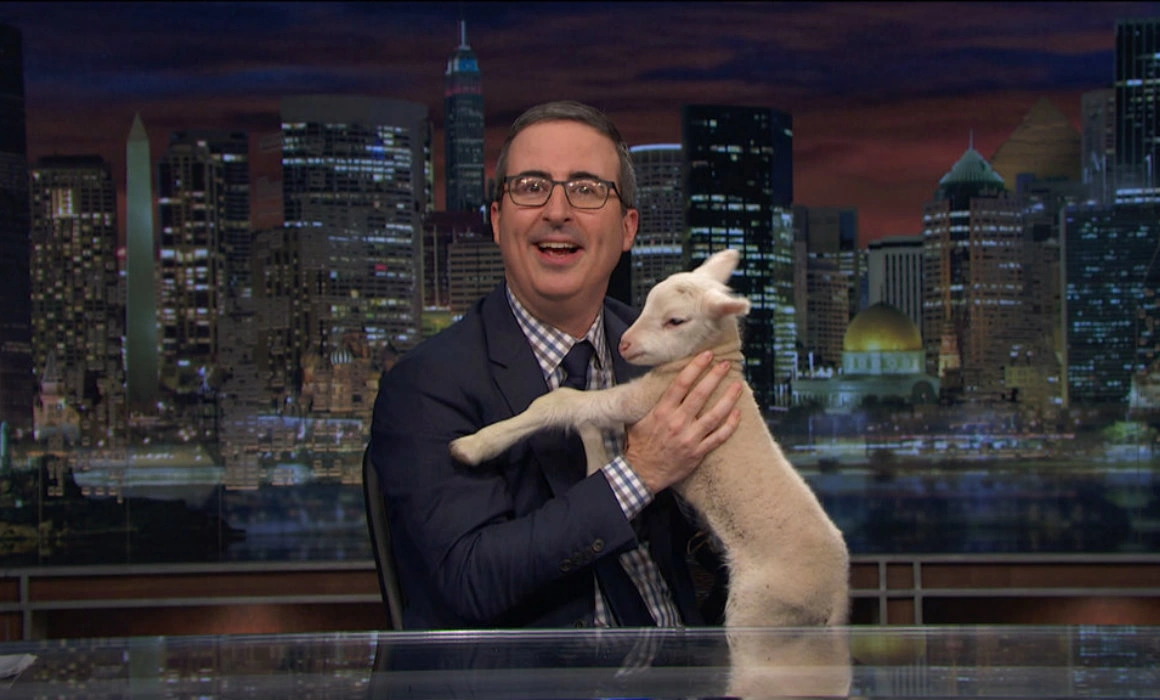In February this year I headed over the Atlantic for a seat at a round table with John Oliver. A few days ahead of the start of season 5 of Last Week Tonight, New York was full of posters showing man banging his head on a table. In the subway, on buses, in Times Square, the image of a person who is desperate but not giving up, a hand raised in the air amid the disaster. In a way, it's a perfect illustration of the world's state of mind in 2018. On the 10th+ floor of the HBO headquarters in New York, four male journalists from Europe and one female journalist (myself) are waiting for John Oliver as if he were the Sphinx. Many questions about Trump, a lot of hope that Oliver has the answers to everything. We've come from countries where democracies are wobbling, social inequities deepen, bigotry takes the place of reason, and nationalistic speeches call for less world and more nation. America isn't faring too well either, swallowed as it is by the fancies and greed of an absurd leader. Gathered around the table in the conference room at HBO, we look like a small international board for emergency situations. Then in comes John Oliver, with his awkward charm and gleeful irony, and blows us away. We're all laughing hysterically and are mesmerized by Oliver's dimples. As long as there are dimples in the world all is not lost, right?
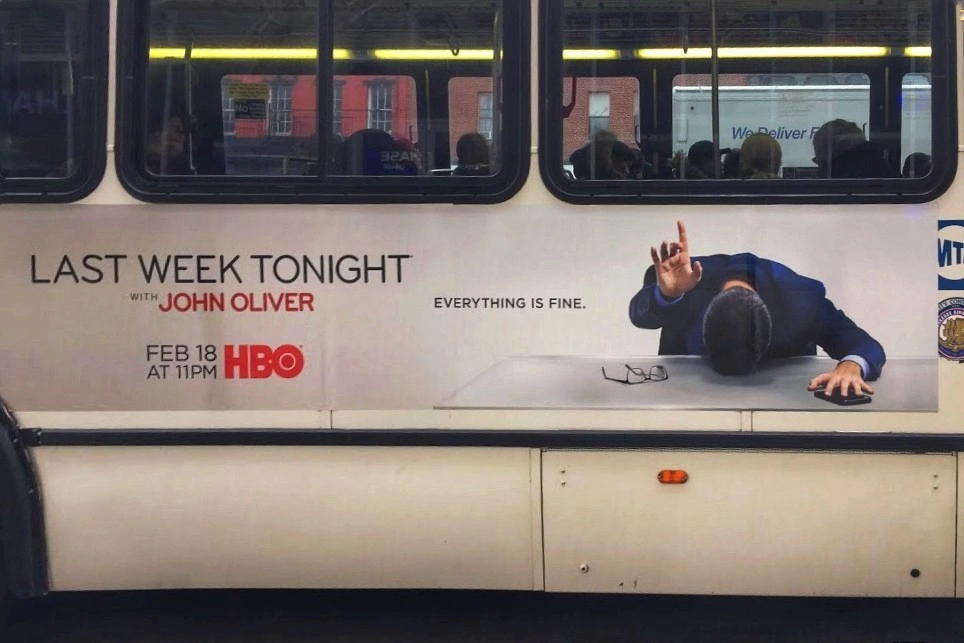
The show
Capital punishment. Corruption in FIFA. The pay gap. Dr. Oz' scams. Nuclear weapons. Police militarization. Drones. Sugar. Lotteries. In short, the first season of Last Week Tonight with John Oliver, a half-hour show on HBO in which a bespectacled guy with dimples and a British accent sits behind a desk and tells you what went on around the world and in the United States during the past week. Fuzzy on the Italian election? No worries, Oliver explains how things stand while making you choke with laughter. You don't think the Italian election has anything to do with you? That's all right, Oliver tells you why you and the entire world should care (the far-right+Berlusconi = LOVE).
Last Week Tonight is not like other late night shows: it airs just once a week, Sunday nights (at 11 PM New York time and Wednesdays on HBO GO), has no guests (with a few notable exceptions - Edward Snowden, Dalai Lama, Stephen Hawking), and dedicates a 20-minute segment to an often complex and unsexy issue of foreign or domestic politics, society, economy, media, etc. These 20-minute segments are uploaded to YouTube the next day and they go viral, gathering millions of views. A slick move for HBO, which reaches audiences on the big planet that is the internet.

Until John Oliver came along, this job was called comedian or late night show host. Now it's harder to pinpoint because Oliver has evaded the template of political and social satire shows and invented a new type of commentary that skilfully combines comedic relief with the thoroughness and seriousness of investigative journalism. US media has tried to label it investigative comedy, comedic journalism, explainer satire, etc. Last Week Tonight, now in its fifth season, has won eight Emmy awards and a Peabody award for providing a "most worthy addition to the news-as-comedy genre. 'Last Week Tonight' doesn't just satirize the previous week's news, it engages in fresh, feisty investigative reports that 'real' news programs would do well to emulate." In fact, US media keeps trying to convince Oliver he is, indeed, a journalist, which irks him. He doesn't want that kind of huge responsibility, he doesn't want to pretend to be something he is not, he just wants to be a good comedian, who makes people laugh and think.
Just like Clark Kent, an unassuming guy working as a journalist for a paper called Daily Planet who flies over and fixes injustices in the world when need be, John Oliver denies he's doing anything sensational. But the media's got him again. The next day after his show airs, headlines look like this:
“John Oliver Eviscerates One of Warren Buffet's Favorite Companies”
“John Oliver Blasts Trump/Harvey Weinstein/America's Sugar Addiction”
“John Oliver Rips Alex Jones/Trump/ the GOP Plan”
“John Oliver Grills Dustin Hoffman”
“John Oliver Takes Aim at NRA TV”
etc.

The effect
You couldn't necessarily tell, but this Englishman in a suit seems to have superpowers. Shielded by the freedom of speech guaranteed by HBO (which is advertisement-free, so doesn't have to answer to anyone) and a good budget, Oliver has earned the trust of dozens of of millions of viewers who watch his show and has become their spearhead in the fight against the demented fast pace of current events. Moreover, Last Week Tonight has influenced legislation and court rulings and stirred up talk on issues that didn't seem to stand any chance of ever making the public agenda but ended up triggering nationwide debates. Among others, John Oliver and his team invented a church, Our Lady of Perpetual Exemption, to show how easy it is to set up a cult and be exempt from paying taxes in America. They also bought the medical debt of 9000 people to point out the anomalies of a system that allows debt collectors to profit off people in trouble. “What we wanted to show is that the barrier of entry to that system is so low that it is incredibly dangerous,” Oliver says. He doesn't plan to buy any more debt, he'd rather “they fix the system”.
Ever since the first season of Last Week Tonight, in 2014, people started talking about the “John Oliver effect” and the impact the show has on people's lives. Time, Bustle and Fortune gathered a few examples of changes triggered by the show. These include laxer bail requirements in the state of New York for low-level offenders, the resignation of Sepp Blatter as president of FIFA, the legislative victory (about to be overturned again) on net neutrality, and the recognition of full Constitutional rights of citizens in American territories.
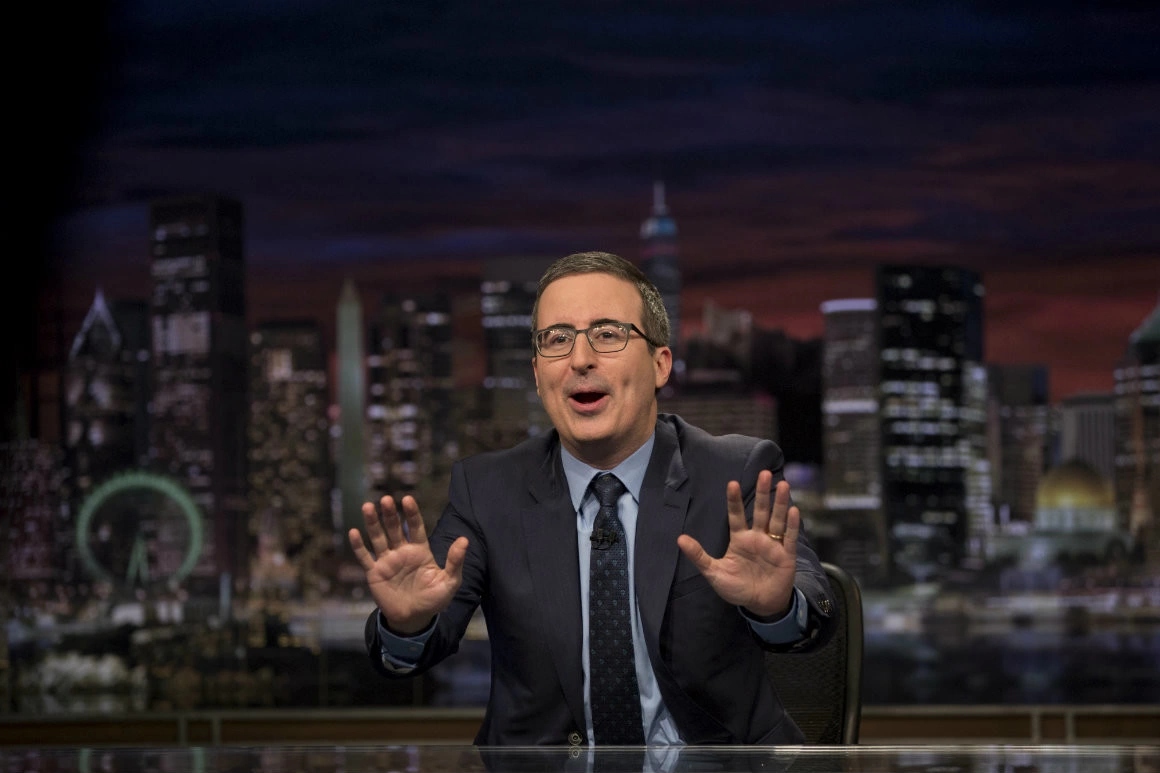
Beyond all that, Oliver manages something else: he makes you think about the filter through which you see reality, about the reasons why you choose to believe some piece of information over another, about the very substance of the news. It's not just news commentary, it's also commentary on how news is made and how it reaches us. What truly matters in a sea of nonsense? What is truth in an ocean of bias? What is worth saying when background noise drowns everything? How could we improve the world we live in?
But who is John Oliver?
First of all, he's an immigrant. He was born in England in 1977, studied English literature at Cambridge, where he felt “not particularly comfortable about being exposed to the top end of the class system”. He's a Liverpool fan. At university, he joined a comedy group led by Richard Ayolade, also a student at Cambridge, who became a good friend. In 2001 he made his debut at the Edinburgh Festival Fringe with a stand-up number where he played the character of an "oleaginous journalist”. He collaborated with a British satirical TV show, then he and Andy Zaltzman co-hosted the radio show Political Animal, then he hosted his own satirical commentary podcast on current events, The Bugle.
I listened to some older episodes of The Bugle, one of which was about the Charlie Hebdo terror attack, and I recognized Oliver's now well-known style - his sharp tongue, self-derision, clever mockery, balanced and informed commentary, the ability to choose relevant stories. Oliver says his comedy starts with very serious research. “You have to make sure that your foundations are rock-solid before you start building nonsense on top of it.” The team of Last Week Tonight includes journalists who previously worked for the New York Times, Pro Publica, and Al Jazeera.

In 2006, John Oliver came to the States for a writing job on the team of The Daily Show with Jon Stewart, one of the most popular comedy shows in America. He worked there for seven and a half years and won three Emmy awards for “outstanding writing”. In summer 2013, he guest-hosted the show while Stewart was off directing his first movie. Three months later, Oliver was offered his own show on HBO.
”Jon Stewart taught me how to do everything,” Oliver says every time he is asked about his time as the British correspondent on The Daily Show. Then he adds he tried to steal everything he could from his mentor Stewart and see what he could do differently. His answer was “depth and length”.

In 2015, Time magazine included Oliver on its list of the 100 most influential people and described him as a “comedic agent of change”. In 2011, the comedic agent of change married Kate Norley, a former US Army medic who served in the Iraq War, whom he met at a Republican convention where he had snuck in undercover with the Daily Show team and ended up being chased by security and hidden by Norley and her veteran colleagues. At that time, he didn't have a green card and his status in the US was uncertain. Now he's a legal immigrant, an Englishman arrived from overseas to sort through world chaos.
The talk
John Oliver enters the conference room and does a quick run-through. Hello, I'm John! He's wearing his TV show host suit, all neat, British elegance. Before Last Week Tonight, Oliver was more ruffled, more casually dressed. Now he's all dressed up. If you're going to joke about capital punishment or gun regulations in America you have to at least look presentable.
“If you were to interview President Trump tomorrow, what would be your first question?” one of the journalists asks. Oliver makes a face. “I don't think that's gonna happen. So I think the first question could be What the fuck am I doing here?” He wouldn't want to interview Trump because he doesn't think he could get an answer out of him that would be intriguing. Ever since Trump became president, the background noise of tweets, fake news, and frivolous topics has grown. It's getting harder and harder to tell apart what really matters from what doesn't. Looking at Romania, it's like talking about Dragnea's girlfriend vs. talking about the defamation law. There's a lot of debate on the former, completely irrelevant topic, and very little and marginal talk on the latter, which has the potential to further weaken the hinges of democracy. We're like dogs running to fetch balls thrown by politicians, celebrities, journalists. Our attention scattered into a thousand links, we no longer know what's important and what isn't. I'm not sure we even care anymore.
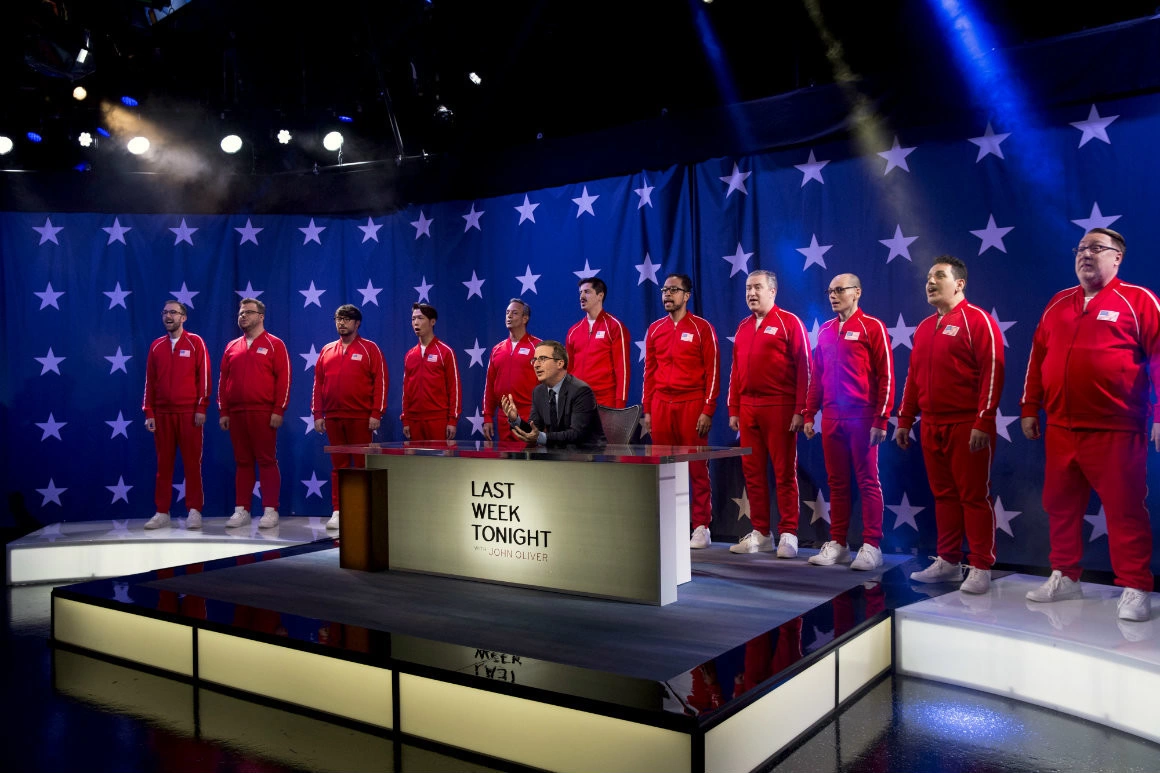
I ask how he keeps a clear head amid all the madness. “It's hard, right? Cause that's the question that all of us are asking. In terms of how we write the show, I guess it's like sifting through the noise which is meaningless and that, if you're not careful, could distract you from the things that happened and are really meaningful and yet not losing something which is like a particular egregious aberration. [Trump] says ear-catching stuff constantly and a lot of that you can probably disregard, even though it's coming out of the president's mouth. Yet you want to make sure that when something like Charlottesville happens you can identify that something. On a spectrum of outrageous things he said, you want to make sure that you still retain the capacity for shock to some extent, cause you can get so callous. I sometimes worry that everything bounces off you and you need to remember that with something like that, just because you become partially immune to certain things that you can say, that you want to make sure that some of them still hurt.” This is something I've noticed in people around me. After more than a year of being exposed to abusive legislation changes, irresponsible public statements, colossal lies, you start getting used to it. What Oliver's saying is that you need to hold on to some part of your brain that doesn't go numb and is still capable of reacting.
The journalist from Hungary is worried satire could make authoritarian leaders seem harmless. It's an old discussion that repeated mockery can change people's perception of a public figure so much that people come to view that person as a living cartoon character that can't be taken seriously. Oliver thinks there's not enough proof to support that theory. But he admits that simply making fun of a public figure can be problematic because it focuses on that person's personality traits instead of what they're saying. “Because he's very good at throwing verbal smoke bombs, he can distract attention like a magician. I don't think that he is skillful enough to use those intentionally himself, he just throws verbal smoke bombs around anyway and people in that confusion can't get shit done. I think one of the problems is not to pay attention to everything that he's saying at the expense of the content of what is happening in D.C. I think that's why we try to contain talking about things that he said of the week briefly to the top of the show and then we can protect the rest of the show, where we talk about things that he's not involved in. We can talk about that at length. Everything from Sinclair Broadcasting to Brexit, confederacy, vaccines, everything that he is not going to be the dominant ingredient in that story.”

Although Oliver tries to give Trump exactly the attention he deserves, no more, no less, the President remains the focus of the talk. The journalists at the round table still want to hear about Trump.
“If you decide to call President Trump a dick, is there anyone at HBO who will jump and say It's too much?” asks the Czech journalist. “Nothing like has ever happened. Is there someone here that could do that? Probably. But they should know better than to say it. They can have those conversations in private. I understand that I'm working for a company, but I don't want to hear any of those. Because the best part of this job is that we get to in an entirely autonomous way, no sponsors. We're incredibly lucky. So their complete silence regarding our show is very important to me. I'm sure that we frustrate them at times.”
The day I left Romania for this meeting with Oliver, a local blogger offered a meal “at the most expensive restaurant” to the journalist who dared tell Dragnea to his face that he was arrogant and thick-skinned. Aside from the sheer condescending gesture towards a profession that is losing more and more ground in the public eye, I've noticed we don't seem to know what a journalist is anymore. It is not a reporter's job to be a funnel for people's anger. And Oliver, who refuses to call himself a journalist, always goes back to principles of this profession that seem more and more difficult to observe in a highly polarized environment. Balance, thorough research, nuance, avoiding bias, especially when you yourself may be seeing things from a single angle.

When they decided to do a show on Brexit, Oliver says he was very cautious due to his own preconceptions on the matter. “The Brexit decision was particularly depressing for me, because I felt going through with it would be a really catastrophic decision to make. Thankfully, due to the resources we have, I could give a research team a few weeks to look into it. I'm coming to this story with a lot of preconceived prejudice. I think this is a really bad idea. Please take a few weeks and let me know if I'm wrong, cause I'm more than happy to take a more nuanced position on this. What was depressing was having them spend weeks looking at it and come back and go, Yeah, there's no reason to believe that this is a good idea. No reason at all. Which made it even more heartbreaking to witness it happening, cause you see the tone of the debate being so vapid, so much willfully misleading information being ejected into a toxic atmosphere, and to know that that was built on a gigantic amount of risk and any optimism was entirely hypothetical.”
Oliver is more demure face to face than on the show, where he rapidly fires information and jokes. With us, he converses at a regular pace, pauses to find the best way to say something, hesitates, avoids passing verdicts. He is experienced enough to take a step back and not get all worked up. The Czech journalist, a former diplomat, says that in his country the gap between people with different beliefs grows deeper and deeper and people no longer understand each other: “Some don't understand why others vote in a certain way or behave in a certain way.” “You mean they are in a bubble?” says Oliver. “It's worth trying to understand people's frustrations even if you don't want to completely validate them sometimes. Like in Britain, the idea that immigration is the key reason to choose Brexit is absurd. I know where some of that frustration comes, some of that is a lack of economic opportunity, some of it is racism, whether is lower case r or capital letters, some of it is like yearning for a Britain that existed in the past and also that didn't exist for everyone back then in the past, so I think it's important to try and understand the reasons why someone would make a decision that you disagree with, but I also don't know to what extent you need to co-sign on that.”

“Do you think that #metoo is not a debatable movement?" asks the journalist on my right, convinced people would be all over you if you tried to bring any nuance in the discussion. Oliver cares about nuance: “Every issue we talk about is always more nuanced than maybe we thought going in. Even if your conclusions are the same as they were going in there, your understanding of the complexities underneath it, our understandings are always deepened. Like in the piece we did on vaccines, where that is a very emotional issue to some people and yet the science underneath it is helpfully concrete, so with that we wanted to try and understand people's emotions in it. We wanted you to understand that people can be frightened whist also not yielding to the fact that there is absolutely no link between vaccines and autism. In that piece, we wanted to let people know that is was understandable to be scared, but that our conclusion and the conclusion of science is that there is no link there. So I guess that would be one example where you would try and show that the shades of gray, that there can be emotion in an issue, whilst getting back to the fact that it is one of those rare case where it is binary at the end, there is no link.”
“Would you consider running for office when you're done with comedy?” “No, God, no!” Oliver says. “There's a constitutional problem.” “Like Schwarzenegger,” the journalist says. “Like Schwarzenegger with significantly lower muscle mass,” Oliver quips. He says he has no interest in doing that. He doesn't think he has the skills or the sets for that world. Although people see him as a savior, Oliver is uncomfortable whenever people put him o a pedestal. In 2014, he told Rolling Stone he hated the idea of people starting to see him as America's comedic conscience. “If that's true, the canary in the coal mine is dead. It's way too much responsibility, and I have no interest in accepting that. Yeah, you have to look elsewhere. You just have to!” His constant self-mockery and the jokes about himself he always slips into the show help a lot.

“Self-mockery is my emotional anchor,” he says. “Without that, I'm adrift in life. That's just how I am as a person and also I don't really feel like I occupy a high ground. It's important to know that I don't really think of myself as being on any kind of pedestal. So the best way to prove that is to accurately describe the ditch that I think I dwell in. Some of the funniest jokes we've had and some of the ones I've loved so much were vicious insults about myself. There was one joke we had that stuck with me for ages that I look like Harry Potter reflected in a door knob. That stuck with me cause it's accurate, it's funny and, in the early years of my life, that probably would have destroyed me.”
It's been half an hour of laughter, followed by a serious question, then more laughter. Kind of like an episode of Last Week Tonight. I ask whether he fears there would come a moment when something so terrible happens to America or to the rest of the world that he wouldn't be able to joke about it. First he bursts into laughter, then he becomes serious. “Probably on a human level I am concerned about that, on a comedic level... Like, you see doctors and nurses sometimes working awful scenarios, seeing awful tragedies, it can be pretty funny, because you have to act as a kind of life preserver. So yeah, I would imagine I'm gonna be joking my way to the mushroom cloud.”

We only have a few more minutes together and then each journalist will go their own way and each agent of change will prepare their next show. And in each country where populism fills the holes of democracy and fake news spreads faster than the truth there will be people who will try to understand those with different beliefs and people who have long given up, people who will always second-guess their own opinions and beliefs and people who will become even more ingrained in theirs, people who will leave and people who will stay.
“Before Bush was elected, many stars said they would move to Canada. And then nobody left. The same with Trump... ” one journalist says. “Yeah, it' always nonsense. It was the same with President Obama, when people on the right said If Obama is in office, I'm going. No one leaves. Plus, you shouldn't leave, right? If you love this country, you should like it at its best and its worst, whatever you think that best and worst is. Americans are bluffing there, whenever they say I'm moving to Canada, it's bullshit. Where's Britain gonna go? Into the North Sea?”
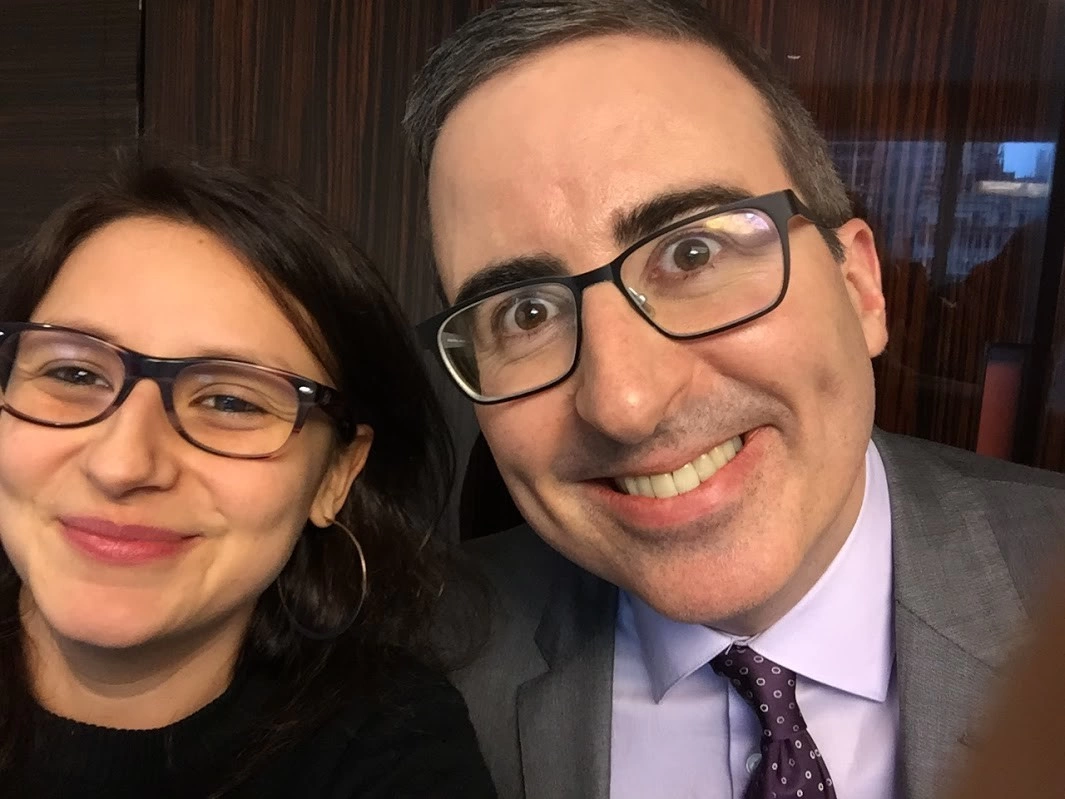
Translated from the Romanian by Oana Gavrilă
